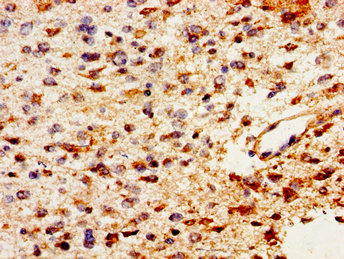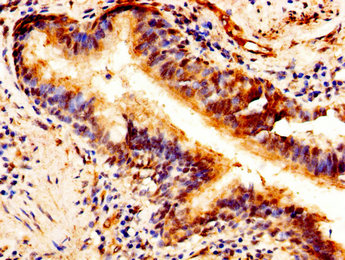PTN Antibody
-
货号:CSB-PA10239A0Rb
-
规格:¥440
-
促销:
-
图片:
-
其他:
产品详情
-
产品名称:Rabbit anti-Homo sapiens (Human) PTN Polyclonal antibody
-
Uniprot No.:P21246
-
基因名:PTN
-
别名:HARP antibody; HB-GAM antibody; HBBM antibody; HBGAM antibody; HBGF-8 antibody; HBGF8 antibody; HBNF antibody; HBNF-1 antibody; HBNF1 antibody; heparin affin regulatory protein antibody; Heparin binding growth associated molecule antibody; Heparin binding growth factor 8 antibody; Heparin binding neurite outgrowth promoting factor 1 antibody; Heparin-binding brain mitogen antibody; Heparin-binding growth factor 8 antibody; Heparin-binding growth-associated molecule antibody; heparin-binding neurite outgrowth promoting factor antibody; Heparin-binding neurite outgrowth-promoting factor 1 antibody; NEGF1 antibody; Neurite growth promoting factor 1 antibody; Neurite outgrowth-promoting factor; heparin-binding antibody; OSF-1 antibody; OSF1 antibody; Osteoblast-specific factor 1 antibody; pleiotrophin (heparin binding growth factor 8; neurite growth-promoting factor 1) antibody; Pleiotrophin antibody; PTN antibody; PTN_HUMAN antibody
-
宿主:Rabbit
-
反应种属:Human
-
免疫原:Recombinant Human Pleiotrophin protein (33-168AA)
-
免疫原种属:Homo sapiens (Human)
-
标记方式:Non-conjugated
本页面中的产品,PTN Antibody (CSB-PA10239A0Rb),的标记方式是Non-conjugated。对于PTN Antibody,我们还提供其他标记。见下表:
-
克隆类型:Polyclonal
-
抗体亚型:IgG
-
纯化方式:>95%, Protein G purified
-
浓度:It differs from different batches. Please contact us to confirm it.
-
保存缓冲液:Preservative: 0.03% Proclin 300
Constituents: 50% Glycerol, 0.01M PBS, pH 7.4 -
产品提供形式:Liquid
-
应用范围:ELISA, IHC
-
推荐稀释比:
Application Recommended Dilution IHC 1:20-1:200 -
Protocols:
-
储存条件:Upon receipt, store at -20°C or -80°C. Avoid repeated freeze.
-
货期:Basically, we can dispatch the products out in 1-3 working days after receiving your orders. Delivery time maybe differs from different purchasing way or location, please kindly consult your local distributors for specific delivery time.
相关产品
靶点详情
-
功能:Secreted growth factor that mediates its signal through cell-surface proteoglycan and non-proteoglycan receptors. Binds cell-surface proteoglycan receptor via their chondroitin sulfate (CS) groups. Thereby regulates many processes like cell proliferation, cell survival, cell growth, cell differentiation and cell migration in several tissues namely neuron and bone. Also plays a role in synaptic plasticity and learning-related behavior by inhibiting long-term synaptic potentiation. Binds PTPRZ1, leading to neutralization of the negative charges of the CS chains of PTPRZ1, inducing PTPRZ1 clustering, thereby causing the dimerization and inactivation of its phosphatase activity leading to increased tyrosine phosphorylation of each of the PTPRZ1 substrates like ALK, CTNNB1 or AFAP1L2 in order to activate the PI3K-AKT pathway. Through PTPRZ1 binding controls oligodendrocyte precursor cell differentiation by enhancing the phosphorylation of AFAP1L2 in order to activate the PI3K-AKT pathway. Forms a complex with PTPRZ1 and integrin alpha-V/beta-3 (ITGAV:ITGB3) that stimulates endothelial cell migration through SRC dephosphorylation and activation that consequently leads to ITGB3 'Tyr-773' phosphorylation. In adult hippocampus promotes dendritic arborization, spine development, and functional integration and connectivity of newborn granule neurons through ALK by activating AKT signaling pathway. Binds GPC2 and chondroitin sulfate proteoglycans (CSPGs) at the neuron surface, leading to abrogation of binding between PTPRS and CSPGs and neurite outgrowth promotion. Binds SDC3 and mediates bone formation by recruiting and attaching osteoblasts/osteoblast precursors to the sites for new bone deposition. Binds ALK and promotes cell survival and cell proliferation through MAPK pathway activation. Inhibits proliferation and enhances differentiation of neural stem cells by inhibiting FGF2-induced fibroblast growth factor receptor signaling pathway. Mediates regulatory mechanisms in normal hemostasis and in hematopoietic regeneration and in maintaining the balance of myeloid and lymphoid regeneration. In addition may play a role in the female reproductive system, auditory response and the progesterone-induced decidualization pathway.
-
基因功能参考文献:
- Molecular crosstalk between tumour-associated macrophages and glioma stem cells through PTN-PTPRZ1 paracrine signalling supports glioblastoma malignant growth. PMID: 28569747
- Expression of Mac-1 on the surface of human embryonic kidney (HEK) 293 cells induced their adhesion and migration to PTN. Accordingly, PTN promoted Mac-1-dependent cell spreading and initiated intracellular signaling manifested in phosphorylation of Erk1/2. PMID: 28939773
- This study showed that increased serum pleiotrophin levels are associated with better developed coronary collateral circulation in patients with chronic total occlusion in at least one major coronary artery. PMID: 28885394
- Pleiotrophin, a target of miR-384, promotes proliferation, metastasis and lipogenesis in hepatitis B virus-related hepatocellular carcinoma. PMID: 28557334
- Elevated plasma midkine and pleiotrophin levels in systemic lupus erythematosus (SLE) patients suggest their involvement in this disease. PMID: 27903979
- High PTN and N-syndecan expression was closely associated with metastasis and poor prognosis, suggesting that they may promote tumor progression and perineural invasion in the orthotopic mouse model of pancreatic cancer. PMID: 28638231
- PTN expression in glioma cells is associated with chromosome 7 gain. PTN enhances PDGFB-induced gliomagenesis by stimulating proliferation of neural progenitor cells. PMID: 27806344
- an early extracellular space disruption of PTN composition induces short- and long-term defaults in the establishment of proper functional cerebellar circuit. PMID: 26399645
- NK cells promote fetal development through the secretion of growth-promoting factors, pleiotrophin and osteoglycin. PMID: 29262349
- PTN knockdown attenuated the progression of experimental PVR in vivo. These findings provide new insights into the pathogenesis of PVR. PMID: 28083679
- Annealing helicase HARP closes RPA-stabilized DNA bubbles non-processively. PMID: 28334870
- Neural precursor cell (NPC):glioma cell communication underpins the propensity of glioma to colonize the lateral ventricle subventricular zone (SVZ) through secretion of chemoattractant signals toward which glioma cells home; analyses of SVZ NPC-secreted factors revealed the neurite outgrowth-promoting factor pleiotrophin, with required SPARC/SPARCL1 and HSP90B as mediators of this chemoattractant effect. PMID: 28823557
- these data indicate that PTN-PTPRZ-A signaling controls the timing of oligodendrocyte precursor cell differentiation in vivo, in which the CS moiety of PTPRZ receptors maintains them in a monomeric active state until its ligand binding. PMID: 27445335
- PTN could be considered as a potential biomarker for the presence of breast cancer. PMID: 28041942
- this study shows that the expression of PTN is significantly downregulated in keloid fibroblasts compared to normal human fibroblasts PMID: 27465069
- findings link pleiotrophin abundance in gliomas with survival in humans and mice, and show that pleiotrophin promotes glioma progression through increased VEGF deposition and vascular abnormalization. PMID: 26645582
- PTN levels in amniotic fluid were found to be lower in pregnancies complicated by chorioamnionitis than in healthy pregnancies. PMID: 27089523
- Increased Pleiotrophin Concentrations in Papillary Thyroid Cancer PMID: 26914549
- Data show that binding of pleiotrophin (PTN) to neuropilin-1 (NRP-1) stimulated the internalization and recycling of NRP-1 at the cell surface. PMID: 26408254
- PTN and its signaling components may be of significance in the pathogenesis of epithelial ovarian cancer. PMID: 25418856
- High serum pleiotrophin levels are associated with non-small cell lung cancer. PMID: 25743809
- PTN expression in glioma was higher than in paratumor tissues. Overexpression was associated with the WHO grade, low Karnofsky score, time to recurrence, and poor survival. Co-expression of midkine and PTN had a worse prognosis than either alone. PMID: 25001988
- PTN was found to express abnormally high in lung cancer, especially small cell lung cancer tissue. PMID: 25864755
- antagonizes the cell-cycle-stimulating activity associated with Brd2, thus enhancing induced neuronal differentiation PMID: 24695857
- Over expression of PTN is significantly correlated with poor prognosis in gastric cancer patients. PMID: 25436328
- Suppression of PTN activity with an anti-PTN antibody promoted apoptosis of cells. PMID: 24698102
- pleiotrophin is transactivated directly by SOX2, a transcription factor essential for the maintenance of both neural stem cells and glioblastoma stem cells. PMID: 23686309
- Ligand independent activation of anaplastic lymphoma kinase (ALK) results when the cytokine pleiotrophin (PTN) interacts with its receptor, the receptor protein tyrosine phosphatase beta-zeta (RPTPbeta-zeta). Review) PMID: 23777859
- PTN is able to induce ex vivo angiogenesis during aging. PMID: 23481101
- elevated expression of PTN is likely to be involved in the pathogenesis of hypertrophic scar (HS). PMID: 23054143
- NDC80, NUF2 and PTN were significantly aberrantly overexpressed in serous adenocarcinomas. PMID: 23056589
- Soluble rhMDK, rmMDK and rhPTN were expressed at a high-level and the protein was purified by a one-step purification using heparin affinity chromatography. Activity of purified rhMDK and rhPTN was confirmed by a cell proliferation assay. PMID: 22871361
- pleiotrophin (PTN) was significantly overexpressed across all our macrodactyly samples. The mitogenic functions of PTN correlate closely with the clinical characteristics of macrodactyly. PMID: 22848377
- Data suggest a physiological role for HARP in modulating (i.e., antagonizing) endogenous anticoagulant activity of heparin-like material in the vasculature. PMID: 22672269
- Our data suggest that PTN is implicated in human prostate cancer growth in vivo PMID: 22783964
- this study shows that PTN expression is upregulated in a mouse model of peritoneal fibrosis and is present in human peritoneal tissues and in peritoneal dialysate effluent. PMID: 21881556
- in postmenopausal women, the PTN gene promoter polymorphism -1227C>T and CT haplotype could contribute to the genetic background of osteoporosis. PMID: 21353611
- in the prostate pleiotrophin (Ptn) functions as a regulator of both mesenchymal and epithelial proliferation, and that androgens regulate Ptn levels. PMID: 20812209
- results demonstrate that P(122-131) inhibits biological activities that are related to the induction of a transformed phenotype in PCa cells, by interacing with RPTPbeta-zeta and interfering with other pleiotrophin receptors PMID: 20738847
- The role of PTN and its involvement in tumor growth and angiogenesis, is summarized. PMID: 20167557
- molecular mechanism of the interactions between the oligosaccharides and pleiotrophin PMID: 20584902
- Overexpression of pleiotrophin is associated with glioblastoma. PMID: 20013808
- Midkine and pleiotrophin have bactericidal properties: preserved antibacterial activity in a family of heparin-binding growth factors during evolution. PMID: 20308059
- The data suggest that PTN expression in the human plaques may be in part regulated by IFN-gamma and that PTN is involved in the adaptive immunity. PMID: 19917672
- Using in vitro infection of peripheral blood mononuclear cells or using peripheral blood mononuclear cells from AIDS patients, the s showed that PTN was sufficient to induce human immunodeficiency virus type 1 (HIV-1) replication. PMID: 20032204
- combination of SDF-1, PTN, IGF2, and EFNB1 mimics the DA phenotype-inducing property of SDIA and was sufficient to promote differentiation of hESC to functional midbrain DA neurons PMID: 19672298
- Pleiotrophin signaling through anaplastic lymphoma kinase is rate-limiting for glioblastoma growth. PMID: 11809760
- overexpression of Pleiotrophin is associated with inflammation and pancreatic cancer PMID: 11895915
- induced the stimulation of tritiated thymidine incorporation in quiescent human peripheral blood mononuclear cells in a dose-dependant manner PMID: 11936877
- PTN induces weak chemotactic and strong haptotactic migration of glioblastoma and cerebral microvascular endothelial cells. PMID: 14692702
显示更多
收起更多
-
亚细胞定位:Secreted.
-
蛋白家族:Pleiotrophin family
-
组织特异性:Osteoblast and brain.
-
数据库链接:
HGNC: 9630
OMIM: 162095
KEGG: hsa:5764
STRING: 9606.ENSP00000341170
UniGene: Hs.371249
Most popular with customers
-
-
YWHAB Recombinant Monoclonal Antibody
Applications: ELISA, WB, IF, FC
Species Reactivity: Human, Mouse, Rat
-
Phospho-YAP1 (S127) Recombinant Monoclonal Antibody
Applications: ELISA, WB, IHC
Species Reactivity: Human
-
-
-
-
-























